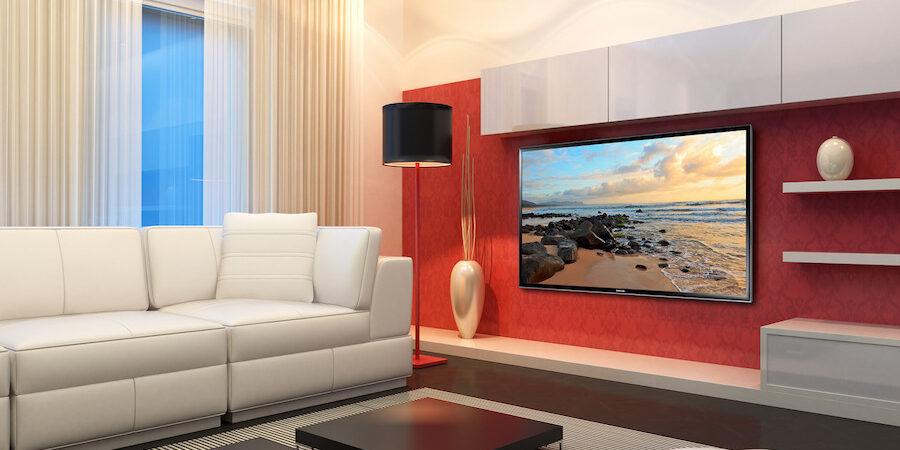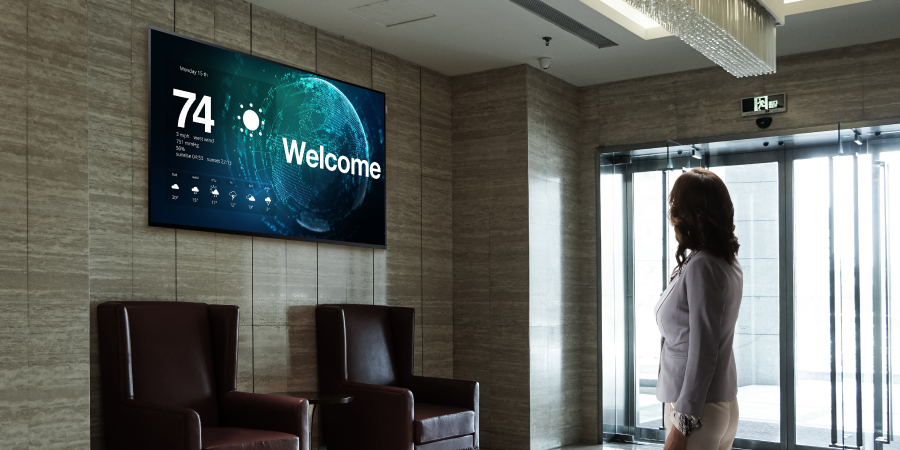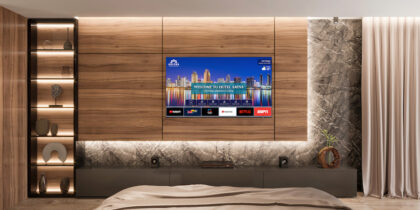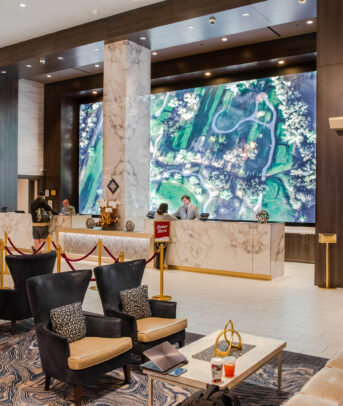By its very nature, the hospitality industry strains resources. Hotels are like small cities: Each consumes massive amounts of energy and water while also producing waste.
The hospitality market has always stayed well ahead of the curve regarding sustainability. In its earlier stages, this came as location-specific programs, such as recycling stations and biodegradable cutlery and straws at on-site restaurants and bars. Now, hotel brands are going further in their efforts to reduce their carbon footprints by reducing energy use, water consumption and waste.
Sustainability in hospitality industry examples
Many of the world’s most scenic cities rely heavily on tourism to support the local economy — but these same environments often need to be protected and preserved. This creates a challenge for the hotel sector: walking the line between sustainability and cost-effectiveness, especially in light of supply chain and labor shortages.
One standout feature hotels can institute is electric vehicle (EV) charging stations. As more drivers choose EVs, they’ll need places to charge them, and hotels are an obvious place to do so. They’re also the perfect spot to advertise restaurants, activities and other messaging on outdoor digital signage.
Small changes can make a big impact, too. Many hotels now have refillable soap dispensers attached to shower walls (instead of disposable soap bars) and recycling baskets inside guest rooms. Such changes can make a significant impact when implemented at scale.
Digital transformation and the guest experience
In Booking.com’s 2023 Sustainable Travel Report, 76% of respondents said they wanted to embrace sustainable travel plans over the next year, and 43% said they would pay more to support certified sustainable travel options. Enterprising hospitality brands know they must continue to evolve their sustainability efforts as new technologies enter the market.
Hotels can make a great first impression among eco-minded guests with Samsung Kiosk. Guests can check-in digitally (eschewing paper receipts) and return plastic keys to the kiosk to be recycled at checkout.
On-site restaurants are another opportunity for eco-friendly upgrades. Digital signage outside dining areas can advertise daily specials; inside, they can show menus by daypart. Meanwhile, tablets at the table can replace paper menus for a sleek digital aesthetic that ties into inventory management systems, instantly eliminating “86ed” items from guests’ view.
Smart TVs in sustainable hotel guest rooms
One way a hotel can reduce its carbon footprint and energy consumption is by upgrading old TVs with set-top boxes to sleek all-in-one TVs in guest rooms and public spaces. Because TVs are a standard feature of nearly every chain hotel room, choosing the most eco-friendly option presents a huge opportunity for sustainable hotels to make a significant impact.
Replacing traditional set-top boxes with smart TVs helps hotels conserve energy. External media players consume significant electricity, and Samsung smart hospitality TVs, which have everything built in, eliminate that cost. The TVs have met energy performance standards to become ENERGY STAR certified, too.
Smart TVs are the most logical option for today’s travelers. In a post-pandemic world, businesses, including hotels, are going increasingly digital. With in-room TVs, guests can conveniently check out the in-room dining or restaurant menus and spa services, or find information about the area. Instead of rifling through a three-ring binder of paper materials — which are often unattractive, bulky, and have been handled by many people — guests can navigate these menu options with one remote that they know has been sanitized before they arrived. Smart TVs deliver a customized in-room experience with the ease of operation of a consumer TV.
Digital transformation and the guest experience
Learn how a single, unified digital solution can elevate and personalize your guest experience. Download Now
In addition, smart TVs feature a sleek, timeless design that saves room and is much more attractive than standard set-top units. These units traditionally sit on a bulky dresser and have several external cords, which are prone to getting tangled or unplugged. Guests may accidentally disconnect these cords without realizing it, resulting in frustration and a negative brand experience.
Often, these cords are plugged into the work desk, which is not only unpleasant to the eye but also defeats the purpose of the desk because guests often don’t have sufficient room to work or enough electrical outlets to power their own devices. Samsung’s cordless hospitality-grade TVs make for a more visually appealing setup.
State-of-the-art technology in hotel rooms
Thought leaders in the hotel industry understand that sustainability makes good business sense. The most innovative brands have gone beyond entry-level guest-facing initiatives and are now looking to display technology to help maximize sustainability in their business purchases and operations.
Hotels can reduce their carbon footprint by implementing LED signage — which consumes between 50% and 70% less electricity than halogen, incandescent or fluorescent counterparts. LED is versatile in a hotel setting, from outdoor advertising signage to indoor wayfinding displays. Not only does this result in immediate energy savings — and therefore, cost reduction — it also eliminates variables such as printing and delivery costs.
Samsung’s QM Series comes in four display sizes ranging from 43 to 98 inches and is ideal for use in hotel lobbies, restaurants and other public spaces. Boasting ultra-high-definition 4K resolution, non-glare panels — which provide better visibility from all angles — plus HDR+ compatibility, QM converts and elevates standard-definition content to HDR quality for sharper contrast and more vivid color. It also performs edge restoration and noise reduction to optimize on-screen text and imagery.
How can hotels be more sustainable?
Among its many sustainability initiatives, Samsung is working to incorporate more recycled plastic into its product lines, which saves energy, conserves resources and minimizes e-waste. Samsung currently uses 30 times more recycled plastic for displays than it did in the past, a figure that continues to increase with each generation of products and their packaging.
With its mission to put the environment first and its ongoing PlanetFirst commitment to sustainability, Samsung can meaningfully engage with hotels that are committed to impactful sustainability.
Learn how a single, unified digital solution can elevate and personalize your guest experience in this free guide. And discover more Samsung hospitality TVs designed to deliver a guest room experience with an at-home feel.








